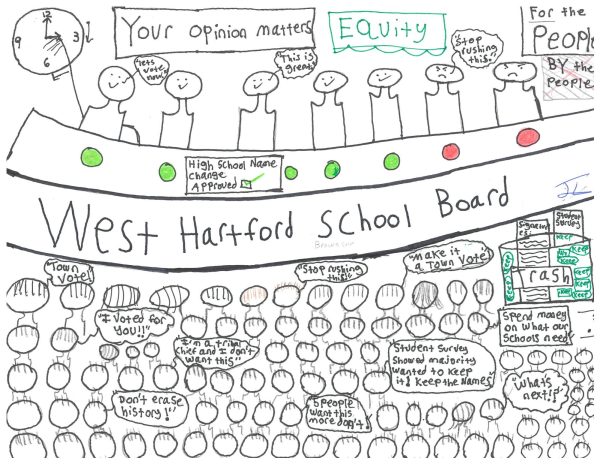The New STAMP Act

A One Penny Stamp from the 1765 Stamp Act in the British colonies. Accessed through Wikimedia Commons.
You have seen the headlines:
“China Threatens Retaliation if US Tariff Hikes Go Ahead” (AP)
“China Wants the World to Stay Silent on Muslim Camps. It’s Succeeding.” (NYT)
“Tensions Rise Amid NBA-China Controversy” (Fox)
“How China Systematically Pries Technology From U.S. Companies” (WSJ)
“Hong Kong protesters Plead for American Protection as Police Crackdown Intensifies” (WaPo)
“China’s Robot Censors Crank Up as Tiananmen Anniversary Nears” (Reuters)
For a myriad of reasons, China has dominated the press cycle like no other country, with the possible exceptions of Russia and North Korea – not exactly the most respectable company to keep.
Disapproval of China is at the highest level it has ever been since they began taking polls on the topic 14 years ago. According to the Pew Research Center, 60% of Americans hold an unfavorable view of China, compared to just 26% with a favorable view. Just one year ago, those numbers were 47% and 38%.
Globally, public opinion of China is mixed. In the 32 countries surveyed, China held a median favorability of 41%, compared to 31% unfavorable. However, among key US allies in Western Europe, the Asia-Pacific region, and Canada, most citizens reported unfavorable dispositions towards China.
With public opinion about China in the US and other Western democracies so low, the current administration’s Sino-American policy disappoints. While confronting China on its economic malpractices is long overdue, President Trump’s execution has ruffled the feathers of many American allies, not to mention completely ignored Americans’ political and social qualms with China.
I believe there is a solution to this problem. I call it the Sino-American Tariff in Accordance with Moral Positions Act – or the STAMP Act for short. Before anyone gets up in arms over the word “tariff,” the fee will be nominal. It could be as low as a flat rate of ten cents a year that would allow a company to do unlimited business and trade with China.
The real enforcement of this law comes from the British colonial Stamp Act: every product sent to China – whether it be containers of soybeans or iPhones – would need a physical or digital stamp to show proof of compliance. This stamp would take the form of a picture of Tiananmen Square, or Xi Jinping as Winnie-the-Pooh (a heavily censored character in China).
Some may label this bill inflammatory or antagonistic. Compared to other tactics, however, this measure is really quite tame, yet assertive. Our allies will have a harder time criticizing the free dispersion of information to a brainwashed populace than they have had attacking damaging unilateral tariffs.
The European Union would find it especially difficult to criticize such a bill, considering the European Court of Justice’s recent decision to mark all exports from Israeli settlements.
More importantly, the STAMP Act would clearly define America’s moral positions, as the name suggests. We will not stand for the suppression of human rights, anywhere in the world. We will not continue to appease the Chinese Communist Party (CCP) and its censorship. We will not bow in the face of China’s money.
Recently, Xi’s playbook has been to isolate American companies, such as the NBA or Apple. Alone, companies cannot hope to push back against Chinese censorship in the face of stockholder pressures. The STAMP Act will provide America with the united front we need to combat authoritarianism.
Instead of choosing whether to do business with one company or the other, the CCP will have to choose whether or not to do business with the United States at all. As we have seen with the trade war, that is an impossible choice for them to make. If President Trump can convince other allies to get on board, the economic pressures will be overwhelming.
The beauty of the STAMP Act is that it does not force the US to choose between money and morals; it links them together. It tells China, in no uncertain terms, that oppressing its citizens and trading with the US are mutually exclusive goals. This is especially important because economic prosperity is one of the current ruling party’s only sources of voluntary support.
Daxiong Guo, a comic book artist who has created some of the most well-known artwork from the Hong Kong protests, told the Wall Street Journal in an interview that he doesn’t think the members of the CCP even believe in Xi’s authoritarian agenda. “The truth is, they just believe in money,” he said.
The rigid brand of communism, as it is practiced in China, doesn’t provide the Chinese people with much in the way of a unifying culture, aside from money. If China chooses to take the hit economically, all while the US teaches Chinese citizens about the tyranny of their rulers, the conditions may be ripe for a regime change.
The STAMP Act is far from perfect; it is not even a fully fleshed out idea yet, with many practical considerations to be taken before it resembles anything close to law. At its core, however, the act stands up to Chinese oppression in a manner that is more likely to garner support from our allies and potentially instigate reforms in the Xi regime.
A One Penny Stamp from the 1765 Stamp Act in the British colonies. Accessed through Wikimedia Commons.
Sources:
Headlines:
Cadell, Cate. “China’s Robot Censors Crank up as Tiananmen Anniversary Nears.” Reuters, Thomson Reuters, 27 May 2019, www.reuters.com/article/us-china-tiananmen-censorship/chinas-robot-censors-crank-up-as-tiananmen-anniversary-nears-idUSKCN1SW03Y.
Mahtani, Shibani. “Hong Kong Protesters Plead for American Protection as Police Crackdown Intensifies.” The Washington Post, WP Company, 14 Oct. 2019, www.washingtonpost.com/world/hong-kong-protesters-plead-for-american-protection-as-police-crackdown-intensifies/2019/10/14/0e936fec-ee37-11e9-bb7e-d2026ee0c199_story.html.
Mcdonald, Joe. “China Threatens Retaliation If US Tariff Hikes Go Ahead.” AP NEWS, Associated Press, 15 Aug. 2019, apnews.com/f07fdf3414ce4f85a228edb655da5053.
Perlez, Jane. “China Wants the World to Stay Silent on Muslim Camps. It’s Succeeding.” The New York Times, The New York Times, 25 Sept. 2019, www.nytimes.com/2019/09/25/world/asia/china-xinjiang-muslim-camps.html.
“Tensions Rise amid NBA-China Controversy.” Fox News, FOX News Network, video.foxnews.com/v/6093454822001/#sp=show-clips.
Wei, Lingling, and Bob Davis. “How China Systematically Pries Technology From U.S. Companies.” The Wall Street Journal, Dow Jones & Company, 26 Sept. 2018, www.wsj.com/articles/how-china-systematically-pries-technology-from-u-s-companies-1537972066.
Information:
Cadell, Cate. “China’s Robot Censors Crank up as Tiananmen Anniversary Nears.” Reuters, Thomson Reuters, 27 May 2019, www.reuters.com/article/us-china-tiananmen-censorship/chinas-robot-censors-crank-up-as-tiananmen-anniversary-nears-idUSKCN1SW03Y.
Landau, Noa. “EU States Must Label Products from Israeli Settlements, Top Court Says.” Haaretz.com, 12 Nov. 2019, www.haaretz.com/world-news/europe/.premium-eu-states-must-identify-products-from-israeli-settlements-top-court-says-1.8119332.
Mahtani, Shibani. “Hong Kong Protesters Plead for American Protection as Police Crackdown Intensifies.” The Washington Post, WP Company, 14 Oct. 2019, www.washingtonpost.com/world/hong-kong-protesters-plead-for-american-protection-as-police-crackdown-intensifies/2019/10/14/0e936fec-ee37-11e9-bb7e-d2026ee0c199_story.html.
Mcdonald, Joe. “China Threatens Retaliation If US Tariff Hikes Go Ahead.” AP NEWS, Associated Press, 15 Aug. 2019, apnews.com/f07fdf3414ce4f85a228edb655da5053.
Melchior, Jillian Kay. “Opinion | Does Freedom Have a Future in China?” The Wall Street Journal, Dow Jones & Company, 8 Nov. 2019, www.wsj.com/articles/two-former-prisoners-and-chinas-future-11573252064.
Perlez, Jane. “China Wants the World to Stay Silent on Muslim Camps. It’s Succeeding.” The New York Times, The New York Times, 25 Sept. 2019, www.nytimes.com/2019/09/25/world/asia/china-xinjiang-muslim-camps.html.
Rogin, Josh. “Opinion | Trump and McConnell Are Failing the People of Hong Kong.” The Washington Post, WP Company, 8 Nov. 2019, www.washingtonpost.com/opinions/global-opinions/trump-and-mcconnell-are-failing-the-people-of-hong-kong/2019/11/07/913af586-0193-11ea-8bab-0fc209e065a8_story.html.
Silver, Laura, et al. “People around the Globe Are Divided in Their Opinions of China.” Pew Research Center, Pew Research Center, 30 Sept. 2019, www.pewresearch.org/fact-tank/2019/09/30/people-around-the-globe-are-divided-in-their-opinions-of-china/.
Silver, Laura, et al. “U.S. Views of China Amid Trade War Turn Sharply Negative.” Pew Research Center’s Global Attitudes Project, Pew Research Center, 21 Aug. 2019, www.pewresearch.org/global/2019/08/13/u-s-views-of-china-turn-sharply-negative-amid-trade-tensions/.
“Tensions Rise amid NBA-China Controversy.” Fox News, FOX News Network, video.foxnews.com/v/6093454822001/#sp=show-clips.
Wei, Lingling, and Bob Davis. “How China Systematically Pries Technology From U.S. Companies.” The Wall Street Journal, Dow Jones & Company, 26 Sept. 2018, www.wsj.com/articles/how-china-systematically-pries-technology-from-u-s-companies-1537972066.





